So we’re back from our jaunt in the bush - this post is a little later than planned, but as it happened we couldn’t get internet signal where we were on Saturday and Sunday. It’s been a gruelling week, ended by the most heavenly weekend we could have wished for.
We eventually got to the camp for orphans and vulnerable children rather late on Wednesday evening. As we drove further and further into the bush, it became evident how isolated we really were. After an hour or so of driving along practically non-existent tracks, the flicker of campfires suddenly became visible (it gets dark ridiculously early here) and we were suddenly upon our camping area – this consisted of a slight clearing in the scrub of the bush, where three campfires had been lit. We unloaded the car and within a few minutes, we were sitting around the campfire being silently stared at by thirty sets of watchful eyes.
Oliver began to do some campfire songs with the children, breaking the ice, whilst a few women from the nearest village who were also volunteering began to cook our dinner. As might have been expected, it was nshima with relish, although as the guests we were given some freshly slaughtered village chicken (for which we were grateful, but it has to be said that the muscle-to-bone ratio of these chickens is probably about equal – not much edible meat comes off them). The cooks were also hugely excessive with the nshima, laughing when we said we’d never be able to eat that much, to the point where we had to give over half of it away – it was eagerly grabbed by a little boy whose enthusiasm for leftovers was astounding. Only a few minutes later did I realise why the children were so keen to take our plates – they weren’t given the chicken which we had, and the little boy was desperate to pick the bones for any scraps we’d left behind.
Not long after our food, we began feeling rather sleepy – the flicker of the campfire and its almost uncomfortable warmth on your face have rather a soporific effect. The temperature had dropped to be rather cold – and I mean this by English standards, not African. I was a little apprehensive at the prospect of the night ahead: Eva had brought a sleeping bag, even though we were told it wouldn’t be necessary, whereas I had only packed a sleeping bag liner (like a sleeping bag shaped sheet) and a bivvy bag (which is like a giant heavy-duty plastic bag – it was an afterthought which I thought might come in handy). We settled our ‘beds’ on the bare earth around the fire (without even the luxury of a cushioned sleeping mat) and settled ourselves in. My getting-into-bed routine, which caused much amusement with the children, went something like this:
- Put two hoodies on over my clothing, with hoods up (already beginning to resemble the Michelin man)
- Get into sleeping bag liner (now looking like a caterpillar. The kids especially loved this bit – they all had blankets and had never seen anything like a sleeping bag before)
- Pull two chitengas around me (sheets of material which the women here wrap around themselves for skirts or carrying their babies etc.)
- Get into my bivvy bag and try to fall asleep.
It was an interesting experience.
On the plus side, falling asleep under the millions of stars was wonderful. I’ve never been able to see the night sky so clearly, and it was beautiful. And as for the bugs, I didn’t even notice they were there. The negatives came in the middle of the night when I woke up repeatedly, absolutely freezing, the fire having died. I was eventually woken up by Eva talking to Oliver, asking to move over to his fire (which he had wisely kept going). We both hopped over and spent the rest of the night moderately warmer, although I still woke up with numb feet. We learnt from this the following nights – every time I drifted awake I’d shove another log onto the fire, and somehow it stayed alight.
Somehow, I managed to avoid the dreaded 5am run every morning! I think Oliver took pity on our evident discomfort (and feebleness, in comparison with the children) and allowed us to sleep in. Breakfast every morning consisted of bread and a hard boiled egg, accompanied by wonderful rooibos tea – it’s an African tea I’ve had back in England before, but never made in quite the same way which the women here made it. On the first morning, I was brought a cup of half hot water, half hot milk, with a teabag in. So far so good (albeit very milky). Then one of the women offered me sugar. I don’t usually take sugar in my tea, but thinking it would be rude to refuse, I took the spoon and sprinkled a little in. She looked at me expectantly, then realising I had finished, began to laugh. ‘No!’ she exclaimed, seizing the spoon from me, and proceeded to heap at least four spoonfuls in. Dessert spoons, not teaspoons. I was a little hesitant to try this concoction, but the result was actually incredibly nice. Sort of like a milky natural Ribena.
Our daytimes were spent playing team-building exercises with the children, teaching them how teamwork could help them in life, assisting with talks about sexual health, delivering our own class on human rights and devising plans to avoid nshima without seeming rude (we had it with beans, cabbage, and even in drink form).
 |
| Oliver's 'Water of Life' role play |
 |
| listening to class |
 |
| jumping the 'electric wire' |
 |
| crossing the 'Bridge of Life' |
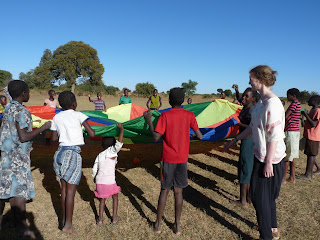
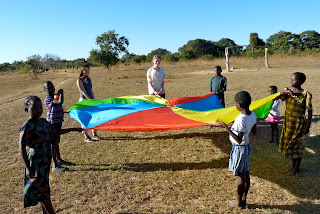
Perhaps it all sounds quite enjoyable, and it was, except when we would suddenly be reminded why we were there. One such reminder came on Friday afternoon when we had to sort the children into groups and take their testimonies on the problems they were having in their life (they spoke in Tonga and we were translated for). Some of their stories were harrowing. There were tales of divorce, where the child was abandoned on the remarriage of their parents; poverty, where the children were forced to work instead of go to school; but one anecdote in particular stuck in my head – this was from a twelve-year-old boy called Alosi. He’d made himself particularly known to us as he was one of the more confident, cheeky children who would sit giggling at us until his friends dared him to say something to us in English – our response would invariably make them burst out into delighted laughter. He constantly had a wide, gleeful grin – the sort of grin which makes you wonder what he’s been up to – but when beginning his testimony he looked down, the smile gone, and refused to make eye contact. Instead he sat picking grass, as he told us that when his father died of AIDS, his mother could no longer look after him, and he was sent to live with his uncle. The uncle resented having another mouth to feed – he punished Alosi physically, made him do the manual labour, and would only feed him the leftovers from the family meal after his own children had finished. Luckily Alosi was able to report this to his mother and the abuse had since lessened, but many of the other children did not have this escape.
We made friends with several of the women who cooked too – we were fascinated with the manner in which they so efficiently prepared the meals over an open fire with barely any equipment, and before we knew it, we had volunteered to help make nshima and prepare the next chickens (although we couldn’t bring ourselves to actually kill them).
 |
| the 'kitchen' |
 |
| Mutenta observing Eva's nshima skills |
And so one afternoon we found ourselves sat under the burning sun pulling hunks of feathers out of a still-warm semi-headless chicken. Although I was slightly repulsed by the gaping bloody neck and the fact that I had been cuddling the live bird the previous afternoon, I’ve always been a firm believer that if I’m going to eat something, I need to face up to what it actually is (or was) instead of imagining it as a desensitised slab of meat in the supermarket. We didn’t stop at plucking either – I ended up carving the bird into edible pieces, and removing the innards, all under the watchful eye of Diandes. She then fried us the livers – ‘our treat’ – but we drew the line when she tried to feed us the heads. I’ve figured that I don’t like eating things that have eyes.
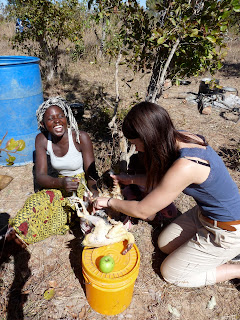 |
| Diandes found our squeamishness hilarious |
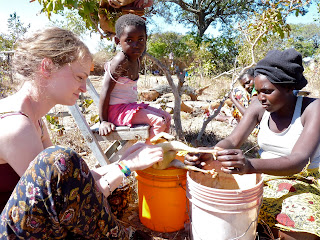 |
| sitting a-plucking |
 |
| (apologies to any vegetarians) |
 |
| hacking off a claw |
Another joy of bush life is bathing. After one particularly sweaty afternoon playing football on the games field with the children, Eva and I returned to camp to find that the women who had stayed back had warmed some water over the fire for us to wash in. Lista carried it away from the camp for us in a large bowl, behind a bush where we would hopefully be undisturbed, and there we had to strip and wash. Good job we’re friends.
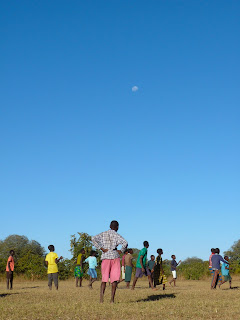 |
| the moon in a clear blue sky - amazing |
 |
| I play football - who knew?! |
 |
| cheeky tackle... |
 |
| enough said. |
On the final night, the ice which had still remained slightly in our relationship with the children, due perhaps to the language barrier and their evident surprise at meeting ‘white people’, was well and truly broken. Eva and I sat at the campfire and suddenly every single child gathered around us, as though they had made an executive decision to talk to us without running away giggling immediately afterwards. We began to chat: they asked the most bizarrely random questions, such as ‘What is your mother’s name?’ but presumably this is just what they are taught. And then the dancing began, starting with a boy called Joshua, whom many of the children seemed to look to as their leader. The style of dance was like nothing I’ve ever seen before: he pulled his trousers tight around his backside and then began to move his hips whilst the rest of his body remained almost completely motionless. It looked bizarre (and almost slightly obscene to our European eyes) but apparently this is the traditional style – soon all of the children were vying for attention and singing along to the clapping. Eva and I laughed until we cried, much to the delight of the kids – especially when tiny little Blessing, the five-year-old daughter of Diandes, demonstrated the hip-thrust move perfectly.
 |
| the dance-off circle |
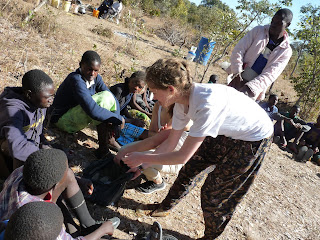 |
| giving a little gift before we left |
As the camp drew to a close on Saturday morning, we were definitely ready for a rest and a bed (I took the hint from the bruises on my hips caused from lying on the hard-baked ground). The plan was to visit Nina for the weekend – she is a Dutch Zambian (Dutch by nationality but has lived in Zambia for over 40 years) and was one of the two founding members of SAPEP. Her farm was a haven for us. As soon as we arrived we were given lunch – imagine our delight when there was not a maize product in sight! It was a wonderful South African / Malay dish (Nina’s husband George is South African), most closely resembling a lasagne but without the pasta, and I think we must have gobbled it as though we hadn’t seen food in a week. We then had a real shower with wonderful hot water, and simply relaxed. The brilliant food just kept coming all weekend, produced almost completely from goods grown on the farm (credit has to be given to the housekeeper and cook, Rosa). By Sunday night Eva and I were practically floating with happiness.
 |
| Nina's beautiful garden |
Somewhere underneath all the enjoyment, I did experience a slight feeling of unease – whilst it was by no means without its worries, the lifestyle which Nina and George enjoyed while running their farm was in complete contrast to the lives of the other Zambians we had met so far. I wondered how it could be that Nina, who had created her income from forming a non-profit charity and often struggled to find funding to pay the salaries, and George, who worked as a farmer like so many Zambians, were so much more privileged than their native counterparts. To some extent they had been lucky – George had inherited the farm from his father, who had bought it when he moved from England. But Nina pointed out that many Zambians would find themselves more wealthy if they had a logical system of inheritance: currently, when the owner of property dies, it will be divided between so many relatives that it is practically worthless. Nina has even seen cases where the house has been destroyed when the family cannot decide who should have it, rather than allow one person to benefit. There are also so many cultural differences in the way farming works – a reluctance on the part of native Zambians to learn new ways or form a long term plan – that the divide in wealth perhaps becomes more understandable. On the other hand, if I came from a background of extreme poverty and lack of education, I’m pretty sure my economic plans would be rather weak too.
It was rather disheartening to leave Nina’s this morning – we were almost becoming accustomed to being fed wonderful food and having things run on time and holding a good conversation with someone who has a similar mindset to us (so many of the Zambians we’ve met have such different cultural values that it’s sometimes hard to converse whilst staying on the same page). The weekend was just so homely for us that it became intensely frustrating later in the day to return to an environment where nothing went to plan, communication was lacking, and everything just seemed to take forever. We went back to LADA (the Law and Development Association) this morning, and did some more work on a funding proposal for a human rights programme which they had asked us to help with (and by ‘help with’, they seemed to simply mean ‘do’). We wouldn’t have minded, except that in order to apply for funding, you need to have a detailed plan as to what the programme involves, and the more we tried to extract this plan from the two women at LADA, the more we realised that they didn’t actually have one.
Our patience has worn a little thin today with the Zambian efficiency (or lack of), but then we were warned that this would happen at some point. Here’s hoping something will brighten us up again tomorrow.
Goodnight everyone, love from us.

























All this talk of your culinary adventures has inspired me - so I've started scouring the supermarkets for nshima to take on our camping holiday when you get back!
ReplyDelete(Not sure you'll be wanting to sleep under the stars in Scotland though).
Ivor x
That's not even funny... x
ReplyDeleteHi Lucy ... nice to hear from you again!
ReplyDeleteRobert says when you come home he's going to keep you well away from our chickens ...
You're certainly having some wonderful/not so wonderful experiences out there. I really admire you for it, but I still think I'll stay in sunny old Eakring.
Will try to help Fremsley and Ivor find some nshima. x
Glad you're both okay! It sounds as if you're having an interesting time! I look forward to the aforementioned nshima when we meet you and Daisy... :)
ReplyDeleteLove to you both,
Joe
you don't know what you're saying Joe! Seriously, don't encourage them...
DeleteLooking forward to seeing you when back :) love from us